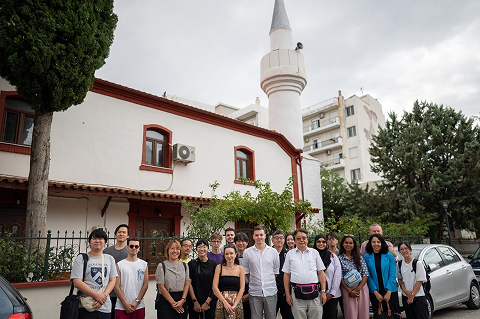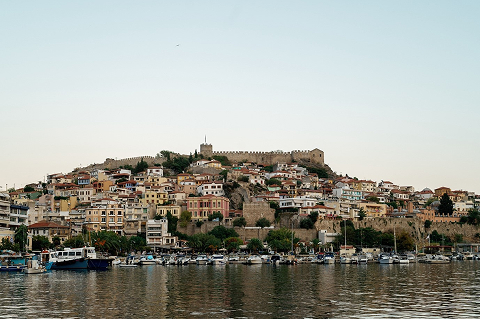2024 Greece
2024 Greece Summer School Report
September 25, 2024
Waseda University Field of specialization: International Education, International student mobility. Graduate School of Asia-Pacific Studies
Identity, Education, and Reconciliation for the Cyprus Problem
Throughout the Kavala summer school week, I have learnt a lot about the situation of The Republic of Cyprus (RoC). I find the Cyprus issue is quite similar to Taiwan issue in a sense that the issues are deeply intertwined with regional and global security concerns involving major powers. Regarding how the country is divided and prospective for conflict resolution and reconciliation, it strongly resonates with Vietnam case before 1975. In this report, I will focus on the Cyprus issue, efforts for reconciliation and peacebuilding, and the role of education and identity in such efforts.
From international relations perspective, Cyprus has a crucial role in security and peace in the Eastern Mediterranean region due to 2 key reasons. First, it has a unique and strategic position in the Eastern Mediterranean. The Cyprus issue is a very complex one, involving not only Greece, Turkey, but also EU and the US. Recognizing its role, The RoC is an active participant in various international security initiatives, including the Organization for Security and Cooperation in Europe (OSCE) and the European Union’s Common Security and Defense Policy (CSDP). However, the key issue is how to resolve the conflict between the RoC (south, mainly Greek Cypriots) and the divided and occupied North (mainly Turkish Cypriots).
With decades of conflicts and distrust, the Cyprus issue is a “frozen” and “intractable” conflict, for which, finding a solution is tremendously difficult. Reconciliation is seen as an essential way to resolve the issue. According to the speakers, there has been a consistent intention and efforts for reconciliation between Greek and Turkish Cypriots, though progress is slow and facing many challenges. For instance, key elements of reconciliation practices, such as history, justice, and values, may be viewed differently by the Greek and Turkish Cypriot communities. The speakers also highlighted the importance of people-to-people exchanges, international law, and the roles of various actors in solving the Cyprus issue and fostering reconciliation between Greek and Turkish Cypriots. However, I think that Cyprus issue is not only the EU’s problem, but also of Greece and Turkey. Active reconciliation between Greece and Turkey is also very important.
What I was mostly interested in the Cyprus issue was the issue of Cypriot identity, which might be very complex due to deep historical roots and ongoing challenges. I think the national building project in Cyprus has struggled to foster an independent and inclusive Cypriot identity. The reasons are not merely because of the deep-seated ethnic divisions between Greek and Turkish Cypriots, but also because of external influences from Greece and Turkey with separate educational systems. After talking with some students, I found out that Cypriots still primarily identify as Greek or Turkish rather than as Cypriots, unlike Taiwan, where a distinct Taiwanese identity has emerged. Addressing the identity question is crucial for achieving lasting reconciliation and stability in Cyprus.
I think Cyprus issue needs active, comprehensive, multifaceted, and multileveled approaches to reconciliation. Education can play a key role in fostering peace and reconciliation in such a divided society. History education is especially important, as the way the past is taught can either reinforce divisions or promote understanding between Greek Cypriots and Turkish Cypriots.Currently, the two communities are taught different versions of history, which hinders the establishment of a shared understanding of the past. To foster reconciliation, history education must address divergent historical narratives, promote critical thinking, and overcome myths and victimization.
The UNESCO Delors report (1996) emphasizes the importance of “learning to live together” as a key pillar of education. Peace education initiatives can promote mutual understanding and trust between the two communities, which is essential for building a cohesive Cypriot identity. Beside history and peace education, there are other aspects of education that can contribute to reconciliation. Dr. Triantaphylluo mentioned ongoing educational exchange projects, which are invaluable in fostering critical and constructive dialogues, contributing to the development of a shared Cypriot identity. Reflecting on my own research, I argue that both Greek and Turkish communities, through embracing a more inclusive Cypriot identity, they can imagine themselves belonging to a larger Cypriot community.
Inclusive Identities as a social-psychological approach to Reconciliation.
The dialogues I had with young Greek participants during the Summer School in Greece provided valuable insights into the dynamics of identity and reconciliation. The participants consisted of two groups: Greek (majority) students and Greek (minority) students, who are Muslim Greeks from the Xanthi region.
One key finding was that both groups strongly identified themselves as Greek rather than European or EU citizens when asked about their sense of belonging. This observation aligns with previous studies that have highlighted the challenges faced by the European Union in cultivating a shared collective identity among its member states. The 2008 Financial Crisis may have contributed to the sentiment among young people towards the EU, as suggested by a professor from the American College of Thessaloniki. It would be interesting to explore how the Greek education system promotes Greek and European identities and how these two identities interact at the grassroots level. This is particularly relevant given the observation that a stronger Greek identity seems to correlate with less favorable attitudes towards reconciliation.

A Mosque in Xanthi City for Muslim Greek
In contrast to the nationalist narratives prevalent during the lectures and discussions, the visit to Xanthi city provided a striking example of peaceful coexistence between Greek people and Muslim people. We visited a mosque built by Turkish people there and learned about its long history and how Islam has been practiced in the region. We were walking by Orthodox churches yet still being able to listen to the Adhan – the Islamic call to public prayer from a nearby mosque. I talked with a Xanthi born student, and he said that he considered himself a Muslim Greek, and he was proud of that inclusive identity. He found no problem with making new friends when he moved to Thessaloniki for his studies. This case study of the Muslim Greek population in Xanthi offers valuable insights into the potential for inclusive identities to foster reconciliation.
The experiences and insights from the Summer School in Greece have reinforced my thoughts on the importance of inclusive identities in promoting reconciliation. The dynamics between National identity (Greek) and post-national identity (EU) and the contrast between the nationalist narratives and the peaceful coexistence in Xanthi underscores the potential for inclusive identities to bridge divides and promote reconciliation process. These findings are very relevant and inspiring for my own research on the mediating role of postnational identity in attitudes toward reconciliation and peacebuilding.
Concluding thoughts
The summer school was held in Kavala, a city with rich multicultural history spanning Greek, Ottoman, and modern periods. The history of Kavala lecture was particularly interesting in a way that it exemplifies Kavala as a place for reconciliation. The complex layers of Kavala’s history, its architectural diversity, and shared cultural heritage could provide opportunities for dialogue and understanding, and the forging of a shared future while acknowledging the complexities of the past.

City of Kavala - A Crossroads of Cultures and Symbol of Reconciliation
My experiences at the Kavala summer school and the dialogues with young Greek participants have provided me with valuable insights into the complex dynamics of identity, education, and reconciliation. The perspectives of international relations experts and scholars during the summer school were heavily geared towards realism, prioritizing national interest above all else. However, to effectively address the challenges of reconciliation and peace, it is crucial to counter this nationalistic realist orientation with a constructivist approach that emphasizes the importance of human and people’s interests.
Education plays a paramount role in promoting peace and reconciliation, and there are many ways in which it can contribute to this process. One key aspect is the development of inclusive identities, which has been the focus of my research. The Cyprus issue serves as a prime example of the challenges faced in fostering an inclusive national identity, with education playing a crucial role in either reinforcing divisions or promoting understanding between communities. The insights from the dialogues with young Greek participants further emphasize the importance of inclusive identities in promoting reconciliation, as demonstrated by the example of peaceful coexistence between Greek and Muslim people in Xanthi.
These findings have reinforced my belief in the potential of constructivism, particularly through the promotion of inclusive identities, to counter realist approaches and foster reconciliation and peace. Education is an essential means to foster a shared sense of belonging and understanding, a foundation for a more peaceful and cohesive world.

